

On mentors, margin of safety, and how to say no. “Fear of failure is higher when you’re not working on the problem.
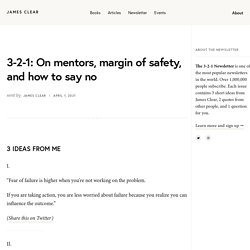
If you are taking action, you are less worried about failure because you realize you can influence the outcome.” (Share this on Twitter) “It’s almost always better to learn from peers who are 2 years ahead of you than mentors who are 20 years ahead of you. Life evolves and most insights get outdated.” (Share this on Twitter) On obsessing over details, how to elicit feedback, and seeking what is significant. “Italy is known for tomatoes.
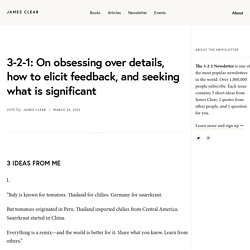
Thailand for chilies. Germany for sauerkraut. But tomatoes originated in Peru. Thailand imported chilies from Central America. Sauerkraut started in China. Everything is a remix—and the world is better for it. A reminder from Atomic Habits: “Habits are the compound interest of self-improvement. A small habit—when repeated consistently—grows into something significant.”
On mediocrity vs. genius, taking risks, and when to ignore a problem. “New goals don't deliver new results.
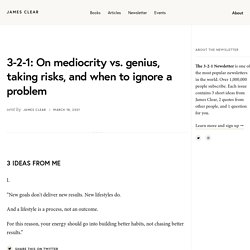
New lifestyles do. And a lifestyle is a process, not an outcome. For this reason, your energy should go into building better habits, not chasing better results.” “Some things are better off ignored than attacked. Attention is the oxygen of conflict. In a surprising number of cases, the way to solve a problem is to ignore it.” On allowing yourself to be happy and full, and how small errors compound. “Repetition unlocks value.
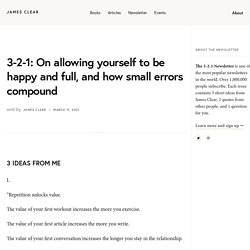
The value of your first workout increases the more you exercise. The value of your first article increases the more you write. The value of your first conversation increases the longer you stay in the relationship. On hate as a defense mechanism, reciprocity, and consistency. “Greatness is consistency.
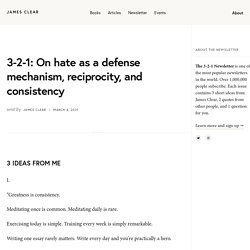
Meditating once is common. Meditating daily is rare. Exercising today is simple. Training every week is simply remarkable. Writing one essay rarely matters. Unheroic days can make for heroic decades.” “An approach that has worked well for me: Friendly, but persistent.” “People generally have more control over their actions than their feelings. On eliminating clutter, reinventing yourself, and unity. “Rome wasn’t built in a day, but they were laying bricks every hour.
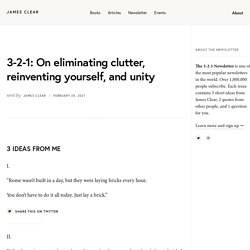
You don’t have to do it all today. Just lay a brick.” “School requires you to learn about things after the answer has already been decided. Life requires you to learn about things while the answer is in the process of being decided.” “Clarity is the elimination of mental clutter. Agility is the elimination of physical clutter. Tranquility is the elimination of spiritual clutter.” Film director and screenwriter Krzysztof Kieslowski on unity: “If there is anything worthwhile doing for the sake of culture, then it is touching on subject matters and situations which link people, and not those that divide people. If culture is capable of anything, then it is finding that which unites us all.
That's why I tell about these things, because in all other things I immediately find division.” Source: Kieslowski's Many Colours Poet Diane Ackerman on reinventing yourself: On attracting luck, taking risks, and the ineffectiveness of anger. “I rarely have good ideas.
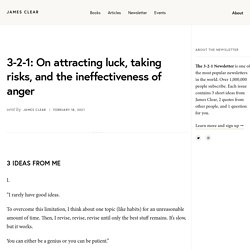
To overcome this limitation, I think about one topic (like habits) for an unreasonable amount of time. Then, I revise, revise, revise until only the best stuff remains. It’s slow, but it works. You can either be a genius or you can be patient.” “You can attract luck simply by sharing your work publicly.” “For a few weeks, I started each morning by writing “What do I actually want?” It’s surprising how useful it is to keep asking the same question. Once I knew what I wanted, I turned it into action steps.” Author John Shedd on taking risks: On copying best practices, being underestimated, and the difficulty of change. “If you never copy best practices, you’ll have to repeat all the mistakes yourself.
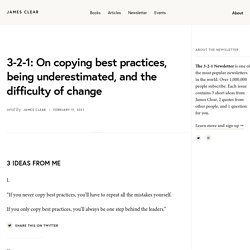
If you only copy best practices, you’ll always be one step behind the leaders.” On being in the right room, confidence, and taking action. “Instead of working toward retirement, work toward your ideal lifestyle.
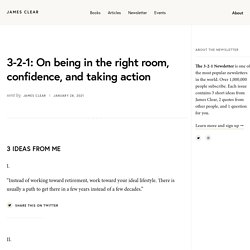
There is usually a path to get there in a few years instead of a few decades.” “It’s usually more important to be in the right room than to be the smartest person in the room. A person with great judgement and average intelligence will usually beat someone with great intelligence and average judgment. On teaching, mastery, and working on important problems. “It took me…200+ articles before I got a book deal.250+ articles before I got major media coverage.100+ interviews before my book hit the bestseller list.You need a lot of shots on goal.
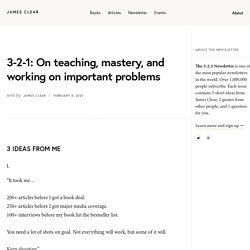
Not everything will work, but some of it will.Keep shooting.” “The challenge for anyone interested in making progress is to simultaneously have (1) the confidence to go after what you want and (2) the humility to accept who you are right now and (3) the willingness to build skills that bridge the gap between 1 and 2.” On fulfilling your potential, self-esteem, and the power of books. “Just have one good day. Then repeat.” “Things that keep talented people from fulfilling their potential: – Trying to please everyone– Imitating the desires of others– Chasing status without questioning why– Playing superhero and trying to do it all alone– Dividing your attention between too many projects” A brief guide to leadership, and when to value feedback.
“In the long run, the way you treat your time is the way others treat it too.” “A brief guide to leadership: Always know the answer to, “What are we optimizing for?” On maturity, how to do exceptional work, and the connectedness of things. “Maturity is learning how to start when you feel like procrastinating and learning how to listen when you feel like talking.” “Solve big problems early. Rebound after one missed workout, not a decade of inactivity.
Repair a strained relationship the next day, not years later. Fix overspending before it becomes a lifestyle. Problems with simple solutions at first become difficult to unwind over time.”